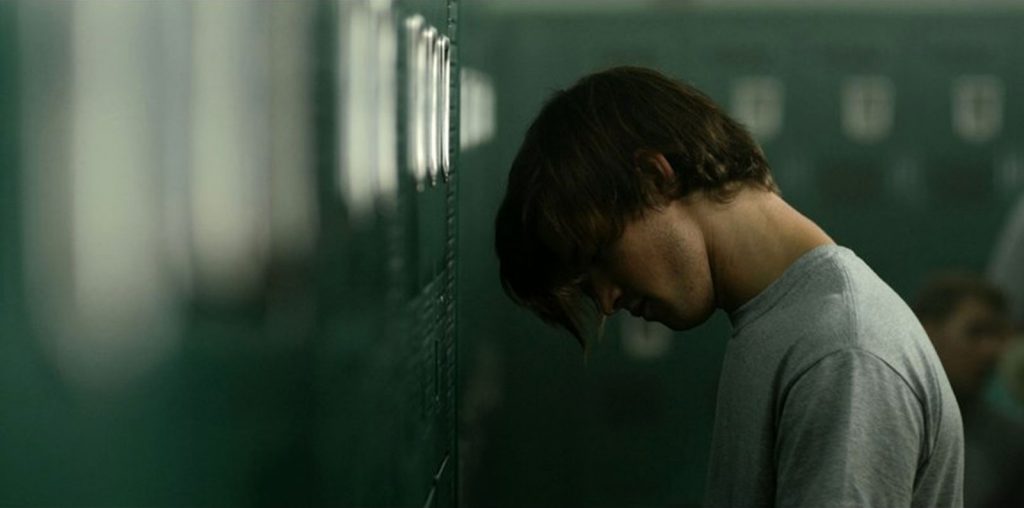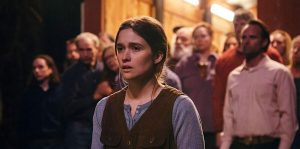
Them That Follow is a nuanced investigative narrative exploring the wild, wonderful world of snake-handling churches. A subsect of Pentecostalism, these churches are very secretive and elusive to much of the modern world. Them That Follow observes that world through what would be an incredibly difficult situation for any teenage girl, but especially for Mara (Alice Englert), due to her religious background. The film has some incredible performances from Englert, Thomas Mann, Lewis Pullman, Kaitlyn Dever as young adults in a remote Appalachian town. Watched like hawks by their faith-based community and parents such as Hope (Olivia Colman like you have never seen her before), and Mara’s father, town pastor Lemuel (Walton Goggins in an incredibly powerful performance). I was blown away by the film’s objectivity and beauty, so I was very happy to discuss the film with its directors, Britt Poulton, and Dan Madison Savage.
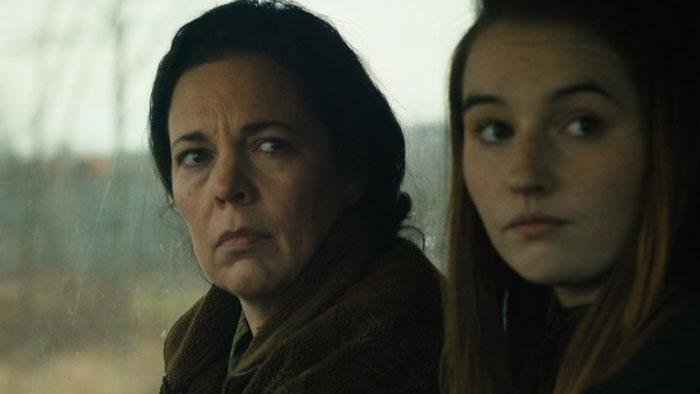
So I truly loved Them That Follow. I grew up in the south but not necessarily THAT kind of south, but I knew a lot of Pentecostal people from school, which the snake-handling churches are a subsect of and I just wanted to know how close either of you were to this narrative personally?
Britt Poulton: Neither of us grew up in Pentecostal or snake-handling communities but I grew up in Utah and was born in Southern Idaho, so I grew up in a small corner of America. It was a Mormon community and I grew up in a Mormon family. So, I definitely found myself in the people of this world, and even though the mountain west and Appalachia have such distinct and rich histories, the way of life and the value system are very similar. I was surprised with the more research I did, the more familiar these folks became to me. It really gave me an opportunity for the themes of my adolescence and my own journey coming into myself and reconciling faith and doubt and knowledge and this life and the next and all these big questions that young people who grow up in religious communities are forced to reckon with all to come of age. But the world itself is not one that I had personal experience with.
Dan Madison Savage: Yeah, nor did I and I think we both knew from our earliest conversations that we were representing a culture and a tradition that was not our own. So we always came to it from a place of respect and it was about unbiased inquiry. I remember learning about snake-handling probably in high school and I think like many people when I first learned about it, I was scared. It’s frightening to see people put their life on the line for anything, particularly something as intangible as faith. I really wanted to get to know these people to understand what brings them to church on Sunday and why did you pick up the serpents. In learning more about them in a way, I’m not a person of faith, but I came to have an incredible amount of respect and even jealousy for them because the snake-handlers have such incredible certainty in their beliefs, they rest their head on their pillow at night confident in their answers to all the big scary questions in life. Where I simply don’t, and I don’t imagine that I ever will, and I can only imagine the serenity and grace that they must walk through this life in and it’s something that we endeavored to show in the film; both the beauty and the terror of this way of worshipping.
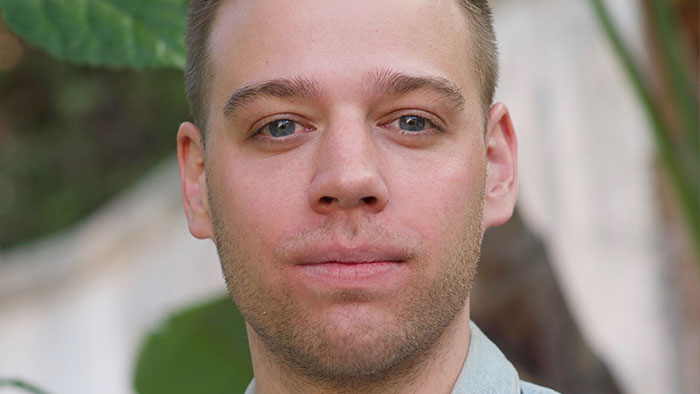
“…it’s about the incredible closeness that the snake-handlers have to the natural world, where God exists in everything and is all-powerful…”
I totally understand that jealousy. Just from observing people who have much more faith than I do in my life and sometimes I wish I had that. I wanted to know though, did either of you in your research for the film get close to any members of a specific community or attend any church services?
Poulton: We did a lot of research in preparation for writing the script. We read many books, watched many documentaries. One book, in particular, we’ve found so inspiring. It’s a nonfiction book called Salvation On Sand Mountain by Dennis Covington. Then from there, after doing research and feeling intellectually satiated, we decided to put that aside and throw that away and really build the story and give it a life of its own and I’m so glad we did that. Snake-handling churches are diverse and vary in their conservatism, their relationship to the outside world, the role that women play. So it was important for us to build a church and a community in our narrative that embodied the tenants that snake-handlers all hold in common and to imagine and fill in the edges of unanswered questions because there is so much that we as outsiders don’t know. After we did write the script and got closer to production, we thought we’re getting the opportunity to actually direct them and to build this world and it was important for us to consult. After many failed attempts, we finally heard back from one snake-handling church in Alabama. I can’t share their name but they were very generous in answering our questions. We had a friendly correspondence with them and whenever we had nuanced questions about how to depict something, we would reach out to them and they were so kind as to answer and clarify for us. That being said, we never visited them. We did, while we were shooting in Ohio, attend Pentecostal church services. So snake-handling is a part of the Pentecostal tradition, snake-handling is just an escalation of that. So, we got to experience what church would be like with speaking in tongues and faith healing and this exuberant, dazzling form of worship that is Pentecostalism. We got it firsthand and it was riveting and it absolutely informed the way we shot the film.
So you said you all shot in Ohio. Could you give me more specifics as to what location scouting for the film was like?
Savage: We shot in Ohio in the very western-most reaches of the Appalachian mountains, just across the river from West Virginia. So much of our film is about seclusion and we needed to create that world and it’s also about the incredible closeness that the snake-handlers have to the natural world, where God exists in everything and is all-powerful and as I said before is both beautiful and terrible. So we were incredibly lucky to be in a community that opened its arms to us, where we shot on location in homes that were open to us by this incredible community. From Mara’s house to Augie’s house to the church, which was actually a shed but on a church camp. Our wonderful production designer, Carmen Navis, rebuilt it from the ground up to create this authentic-as-possible church. Because so many of the snake-handlers, when they do worship and the spaces they worship in aren’t in cute, quaint little churches that were built in the 16th century. They’re in people’s garages, in gas stations, in sheds, they’re worshipping where they can, how they can. So it’s really wonderful that we were able to in our movie church, recreate the same experience with the snake-handlers have themselves in worshipping in new, very unorthodox places.
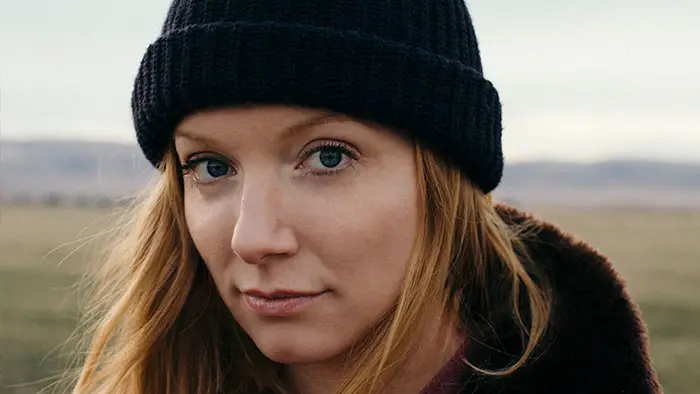
“…it was a triumph to find Walton (Goggins) and for him to have the faith in us that we had in him.”
I definitely want to ask about the cast because they were so wonderful, Just your experience working with them. I especially think that Walton Goggins is incredible as the pastor, Lemuel. But they’re all great. It’s a hard question to ask when there’s limited time and the whole cast is just incredible.
Poulton: Absolutely, you mentioned Walton so I’ll start there. Walton Goggins is a brilliant, brilliant man who can truly do anything. What was so important in casting Lemuel is that he holds the authority to this religious practice and if the audience doesn’t believe Lemuel, they will not believe in us. They will not believe in our film. So it was so important that whoever embodied the role of the pastor not only did so with authenticity but did so with sensitivity because, in the wrong hands, he could come off as a villain, as a one-note religious leader and we’ve all seen too many of those. Something that we knew Walton would bring to the character is a pathos and a sincerity. From the first meeting we had with Walton, we knew that he on his shoulders could carry our world and he really breathed life into the nuances of Lemuel. So that was really for us, the scariest piece of casting, who was going to play Lemuel. Because so much flows from the pastor and so it was a triumph to find Walton and for him to have the faith in us that we had in him. He really became a partner to us through this whole process.
Savage: I’ll also add that this is a film about faith but it’s also a film about family and what happens when our loyalties to those two things come into conflict. Each character has their own answer by the story’s end, but one of the most amazing things I’ve watched in the film–I’ve seen it many times–is that we had such an amazing time on set. All the cast became such wonderful friends that while you’re watching the film, the actors brought so much authenticity not just to the faith but also to them being a family. Where you really believe that Walton Goggins is Alice Engler’s father. You really believe that Olivia Colman and Jim Gaffigan are Thomas Mann’s parents. You really believe that Kaitlyn Dever has been sharing a bed as best friends with Mara throughout their growing up. And that is just a wonderful testament to the emotional authenticity that all of our cast members brought to the film.
They were all incredible. Thank you both so much for this wonderful talk. I loved the movie and I can’t wait to see what the world at large thinks of it!
